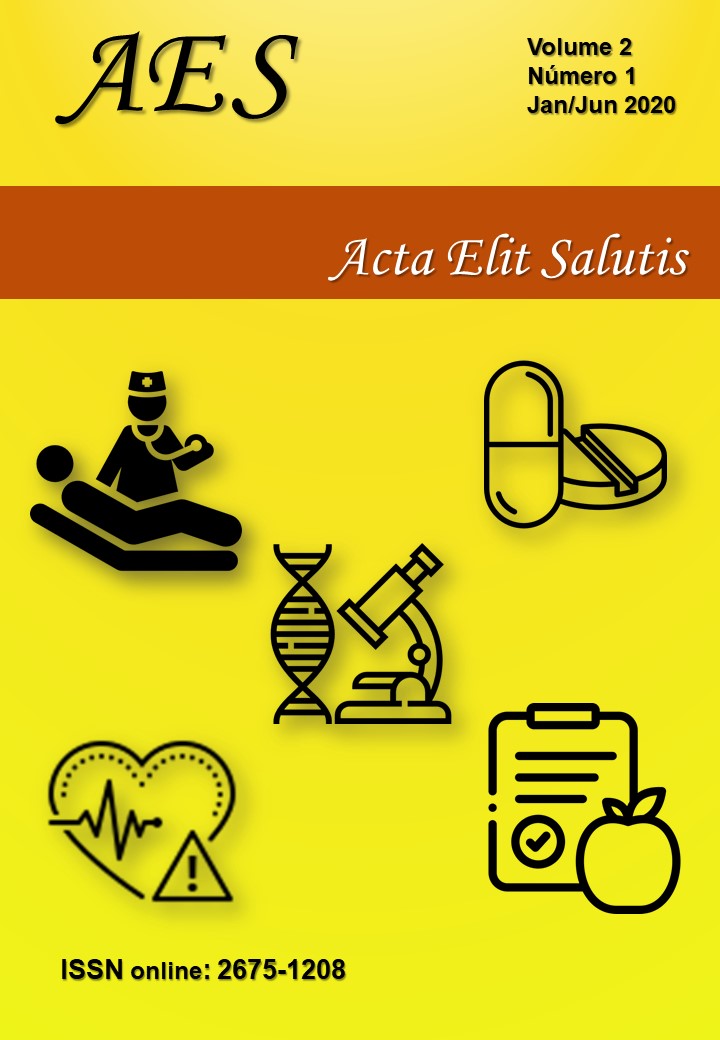Síndrome de Burnout em estudantes de medicina de uma universidade pública da região sul do Brasil
DOI:
https://doi.org/10.48075/aes.v2i1.24423Palavras-chave:
Professional Exhaustion, Medical students, Fatigue, Universities.Resumo
Verificar se existe preenchimento dos critérios para o diagnóstico da síndrome de burnout e sua correlação com variáveis sociodemográficas em alunos do 1º ao 4º ano do curso de medicina da Universidade Estadual do Oeste do Paraná – UNIOESTE, campus de Francisco Beltrão é o objetivo deste estudo. Trata-se de um estudo quantitativo, descritivo, de caráter transversal, realizado com 126 acadêmicos. Para coleta de dados foi aplicado a escala MBI-SS adaptada por J. Maroco e M. Tecedeiro (2009) e um questionário sociodemográfico. Atingiram escores positivos exaustão emocional, descrença e diminuição da eficácia 39,68% (n = 50), 35,71% (n = 45) e 34,12% (n = 43) dos alunos, respectivamente. Fecharam critério para a síndrome de burnout 6,34% dos acadêmicos do curso de medicina. A análise das questões isoladas correspondentes às três características da síndrome também revelou dados significativos. Os resultados apontaram uma média significativa para o subitem exaustão emocional, considerado o primeiro a apresentar evidência e indicativo de potencial risco de desenvolver a síndrome. Descrença e diminuição da eficácia também evidenciaram índices importantes e por isso não devem ser negligenciados.
Referências
Trigo TR, Teng CT, Hallak JEC. Síndrome de burnout ou estafa profissional e os transtornos psiquiátricos. Archives of Clinical Psychiatry. 2007;34:223-233.
Erschens R, Keifenheim KE, Herrmann-Werner A, Loda T, Schwille-Kiuntke J, Bugaj TJ, et al. Professional burnout among medical students: Systematic literature review and meta-analysis. Medical Teacher. 2018;1–12.
Maslach C, Jackson SE. The measurement of experienced burnout. Journal of Ocuppational Behavior. 1981;2:99-113.
Truzzi A, Valente L, Ulstein I, Engelhardt E, Laks J, Engedal K. Burnout in familial caregivers of patients with dementia. Revista Brasileira de Psiquiatria. 2012;34:405-412.
Maslach C, Schaufeli WB, Leiter MP. Job burnout. Annual Review of Psychology. 2001;52:397–422.
Borges AMB, Carlotto MS. Síndrome de Burnout e fatores de estresse em estudantes de um curso técnico de enfermagem. Aletheia. 2004;19:45-56.
Tomaschewski-Barlem, J.G., Lunardi, V.L., Ramos, A.M., Da Silveira, R.S., Barlem, E.L.D. & Ernandes, C.M. (2013). Manifestações da Síndrome de Burnout entre estudantes de graduação em enfermagem. Texto e Contexto Enfermagem 22, 754-62.
Thomas, M.R., Dyrbye, L.N., Huntington, J.L., Lawson, K.L., Novotny, P.J, Sloan, J.A. & Shanafelt, T.D. (2007). How do distress and well-being relate to medical student empathy? A multicenter study.Journal of General Internal Medicine 22, 177–83.
Dyrbye, L.N., Massie, F.S., Eacker, A., Harper, W., Power, D., Durning, S.J., Thomas, M.R., Moutier, C., Satele, D., Sloan, J. & Shanafelt, T.D. (2010). Relationship between burnout and professional conduct and attitudes among US medical students. JAMA 304,1173–80.
Mori MO, Valente TCO, Nascimento LFC. Síndrome de Burnout e rendimento acadêmico em estudantes da primeira à quarta série de um curso de graduação em medicina. Rev. Bras. Educ. Med. 2012;36:536-540.
Maroco J, Tecedeiro M. Inventário de burnout de Maslach para estudantes portugueses. Psicologia, saúde e doenças. 2009;10:227-235.
Schaufeli WB, Martínez IM, Marques Pinto A, Salanova M, Bakker AB. Burnout and engagement in university students: A cross-national study. Journal of Cross-Cultural Psychology. 2002;33:464-481.
Ishak W, Nikravesh R, Lederer S, Perry R, Ogunyemi D, Bernstein C. Burnout in medical students: a systematic review. The Clinical Teacher. 2013;10:242-5.
Viana GM, Silva TG, Oliveira CT, Castro MFR, Carreiro DL, Coutinho LTM, et al. Relação entre Síndrome de Burnout, ansiedade e qualidade de vida entre estudantes de Ciências da Saúde. Revista da Universidade Vale do Rio Verde. 2014;12:876-885.
Kristensen TS, Borritz M, Villadsen E, Christensen KB. The Copenhagen burnout inventory: a new tool for the assessment of burnout. Work & Stress. 2005;19:192-207.
Chagas MKS, Moreira Junior DB, Cunha GN, Caixeta RP, Fonseca EF. Ocorrência da Síndrome de Burnout em acadêmicos de medicina de instituição de ensino no interior de Minas Gerais. Revista de Medicina e Saúde de Brasília. 2016;5:234-45.
Costa EFO, Santos SA, Santos ATRA, Melo EV, Andrade TM.Síndrome de Burnout e fatores associados em estudantes de medicina: estudo transversal.Clínicas. 2012;67(6):573-580.
Viera DR, Brito GD, Paiva LKR, Pinheiro MR, Gonçalves TA, Barral ABCR. Síndrome de burnout em acadêmicos do último ano do curso de graduação em medicina. Unimontes Científica. [Internet]. 2017 Jan [cited 2019 Mai 08]; 19(1). Available from: http://www.ruc.unimontes.br/index.php/unicientifica/article/view/560/401.
Aguiar RLB, Aguiar MCM, Merces MC. Síndrome de Burnout em estudantes de medicina de universidade da Bahia. Revista Psicologia, Diversidade e Saúde. 2018;7:267-276.
Downloads
Publicado
Como Citar
Edição
Seção
Licença
Copyright (c) 2020 Acta Elit Salutis

Este trabalho está licenciado sob uma licença Creative Commons Attribution-NonCommercial-ShareAlike 4.0 International License.
Aviso de Direito Autoral Creative Commons
Política para Periódicos de Acesso Livre
Autores que publicam nesta revista concordam com os seguintes termos:
1. Autores mantém os direitos autorais e concedem à revista o direito de primeira publicação, com o trabalho simultaneamente licenciado sob a Licença Creative Commons Attribution que permite o compartilhamento do trabalho com reconhecimento da autoria e publicação inicial nesta revista.2. Autores têm autorização para assumir contratos adicionais separadamente, para distribuição não-exclusiva da versão do trabalho publicada nesta revista (ex.: publicar em repositório institucional ou como capítulo de livro), com reconhecimento de autoria e publicação inicial nesta revista.
3. Autores têm permissão e são estimulados a publicar e distribuir seu trabalho online (ex.: em repositórios institucionais ou na sua página pessoal) a qualquer ponto antes ou durante o processo editorial, já que isso pode gerar alterações produtivas, bem como aumentar o impacto e a citação do trabalho publicado (Veja O Efeito do Acesso Livre).
Licença Creative Commons
Esta obra está licenciada com uma Licença Creative Commons Atribuição-NãoComercial-CompartilhaIgual 4.0 Internacional, o que permite compartilhar, copiar, distribuir, exibir, reproduzir, a totalidade ou partes desde que não tenha objetivo comercial e sejam citados os autores e a fonte.





